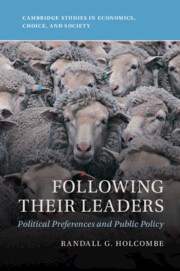Book contents
- Following Their Leaders
- Cambridge Studies in Economics, Choice, and Society
- Following Their Leaders
- Copyright page
- Dedication
- Contents
- Figures
- Tables
- Preface
- 1 Introduction
- 2 Instrumental and Expressive Voting
- 3 Influences over Preference Formation
- 4 Preference Aggregation through Voting
- 5 The Formation of Political Preferences
- 6 Anchor Preferences and Derivative Preferences
- 7 Preferences of Elites and Masses
- 8 Policies That Maximize Political Power
- 9 Patriotism, Propaganda, and the Public Interest
- 10 Implications for Democracy
- References
- Index
10 - Implications for Democracy
Published online by Cambridge University Press: 16 March 2023
- Following Their Leaders
- Cambridge Studies in Economics, Choice, and Society
- Following Their Leaders
- Copyright page
- Dedication
- Contents
- Figures
- Tables
- Preface
- 1 Introduction
- 2 Instrumental and Expressive Voting
- 3 Influences over Preference Formation
- 4 Preference Aggregation through Voting
- 5 The Formation of Political Preferences
- 6 Anchor Preferences and Derivative Preferences
- 7 Preferences of Elites and Masses
- 8 Policies That Maximize Political Power
- 9 Patriotism, Propaganda, and the Public Interest
- 10 Implications for Democracy
- References
- Index
Summary
One motivation for this volume is to question the way that academic models of the political process depict preference aggregation and public policy formation. More significantly, this analysis has implications for democratic political institutions. There is an illusion, promoted by the political elite, that democratic oversight of government can control its power and direct it toward the public interest, but the powerless cannot control the powerful, even if the powerless far outnumber the powerful. The ability of constitutional constraints to limit government power and direct it toward the interests of the masses is also questionable, because those constraints must be enforced. If public policy is designed and implemented by the political elite, ultimately the power of government can be controlled only by a system of checks and balances that enables some of the elite to control the power of others. Democratic institutions can play a role in determining who holds political power, and constitutional constraints can play a role if there are institutional mechanisms to enforce them, but without a system of checks and balances that enables some elites to control the power of others, democracy and constitutional constraints are ineffective.
Keywords
- Type
- Chapter
- Information
- Following Their LeadersPolitical Preferences and Public Policy, pp. 179 - 198Publisher: Cambridge University PressPrint publication year: 2023

